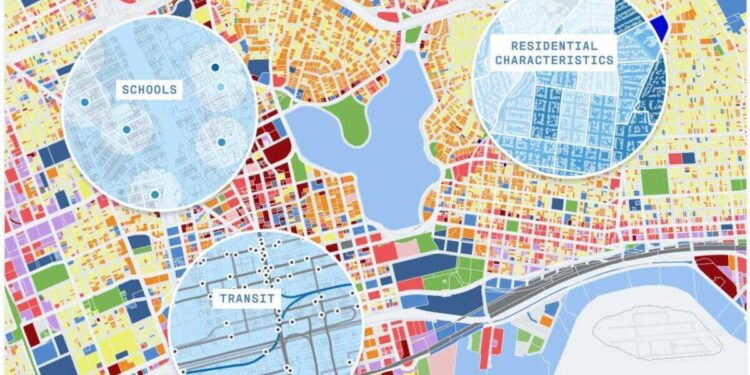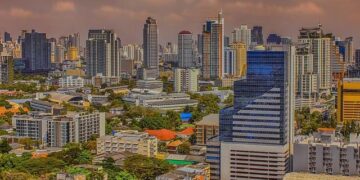In the bustling heart of Abuja, Nigeria’s rapidly expanding capital, the hidden consequences of urban sprawl are revealing themselves beneath the surface of the Wuye River. A recent study dives into how unplanned settlements-often characterized by inadequate infrastructure and unchecked development-are reshaping the delicate ecosystems of this vital waterway. By examining changes in macroinvertebrate communities, researchers are uncovering the subtle yet significant ways urban footprints disrupt aquatic biodiversity. This groundbreaking work not only highlights the environmental cost of informal urban growth but also offers crucial insights for sustainable city planning in one of Africa’s fastest-growing metropolises.
Impact of Unplanned Settlements on Wuye River’s Macroinvertebrate Diversity
Unplanned settlements along the banks of Wuye River have drastically altered the natural habitat, inducing a cascade of environmental stresses that profoundly affect macroinvertebrate communities. These areas, characterized by inadequate waste management, uncontrolled sewage discharge, and rampant deforestation, have contributed to heightened levels of pollutants such as heavy metals, organic waste, and sediments. The resulting water quality degradation disrupts the delicate balance of aquatic ecosystems, leading to a marked decline in sensitive macroinvertebrate taxa. Notably, taxa known for their bioindicator roles, such as Ephemeroptera, Plecoptera, and Trichoptera (EPT), have shown significant population drops in locations adjacent to dense unregulated settlements.
Key factors influencing macroinvertebrate diversity decline include:
- Increased turbidity and sedimentation: Smother benthic habitats, impairing respiration and feeding of macroinvertebrates.
- Chemical contamination: Introduction of heavy metals and organic pollutants leads to toxicity and reduced survival rates.
- Habitat fragmentation: Physical alteration of banks and riverbeds prevents colonization of sensitive species.
| Macroinvertebrate Group | Population Trend Near Settlements | Ecological Sensitivity |
|---|---|---|
| EPT (Mayflies, Stoneflies, Caddisflies) | Sharp Decline | High |
| Oligochaetes (Segmented Worms) | Stable/Increase | Low |
| Chironomidae (Non-biting Midges) | Moderate Increase | Moderate |
Examining Pollution Sources and Habitat Disruption in Abuja’s Urban Waterways
Abuja’s rapid urbanization, particularly within unplanned settlements surrounding the Wuye River, has triggered a cascade of environmental challenges. A multiplicity of pollution sources such as domestic sewage discharge, illicit dumping of solid waste, and runoff laden with agricultural and industrial chemicals has severely degraded water quality. These pollution vectors contribute to elevated nutrient levels and toxic contaminant loads, which in turn destabilize the intricate aquatic ecosystems. Given that macroinvertebrate communities serve as critical bioindicators, the escalating contamination directly alters their diversity and abundance, shedding light on the pressing vulnerability of the river’s ecological integrity.
The physical transformation of riparian zones due to unregulated land use further compounds habitat disruption. Encroachment and deforestation shrink natural buffers, while sedimentation from soil erosion degrades benthic habitats essential for macroinvertebrate colonization. The table below summarizes key pollution inputs and their observed impacts on macroinvertebrate vitality in the Wuye River:
| Pollution Source | Main Contaminants | Impact on Macroinvertebrates |
|---|---|---|
| Sewage Discharge | Pathogens, Organic Waste | Reduced diversity, increased tolerant species |
| Solid Waste Dumping | Plastics, Heavy Metals | Habitat smothering, bioaccumulation risks |
| Agricultural Runoff | Pesticides, Nutrients | Altered community structure, eutrophication |
| Soil Erosion | Excess Sediment | Benthic habitat loss, reduced oxygen levels |
Strategies for Restoring Ecological Balance and Enhancing Water Quality in Wuye River
Efforts to rehabilitate the Wuye River ecosystem demand a multifaceted approach that prioritizes both ecological integrity and community involvement. Key strategies include:
- Riparian buffer restoration: Planting native vegetation along riverbanks to filter runoff, prevent erosion, and create habitat corridors for aquatic and terrestrial species.
- Community-led waste management programs: Mobilizing local residents to reduce pollution through awareness campaigns, proper disposal practices, and the establishment of effective solid waste collection systems.
- Upgrading sanitation infrastructure: Addressing open defecation and untreated sewage discharge from unplanned settlements by integrating eco-friendly wastewater treatment solutions.
- Monitoring bioindicator species: Using sensitive macroinvertebrate communities as early-warning systems to track water quality changes and assess the effectiveness of restoration interventions.
Data-driven policies supported by continuous environmental monitoring are essential to sustaining these efforts. The table below summarizes the expected outcomes linked with various restoration actions, guiding stakeholders in prioritizing interventions for maximum ecological impact.
| Restoration Action | Ecological Benefit | Impact on Water Quality |
|---|---|---|
| Riparian buffer zones | Increased habitat diversity | Reduced nutrient and sediment runoff |
| Waste management programs | Lower pollution loads | Decreased organic contaminants |
| Sanitation infrastructure upgrades | Improved public health | Elimination of pathogenic discharge |
| Macroinvertebrate monitoring | Enhanced ecosystem awareness | Timely detection of contamination spikes |
Closing Remarks
As urbanization continues to expand unchecked, the findings from the Wuye River underscore the pressing need for sustainable planning in rapidly growing cities like Abuja. This study reveals how unplanned settlements not only reshape the physical landscape but also ripple through local ecosystems, altering the delicate balance of macroinvertebrate communities that serve as critical indicators of water quality and river health. Moving forward, integrating environmental considerations into urban development policies will be essential to preserving Nigeria’s freshwater biodiversity and ensuring the resilience of its river systems amid ongoing urban challenges.














Did a Restorer Secretly Paint Italian Prime Minister Giorgia Meloni Into a Historic Church Fresco?